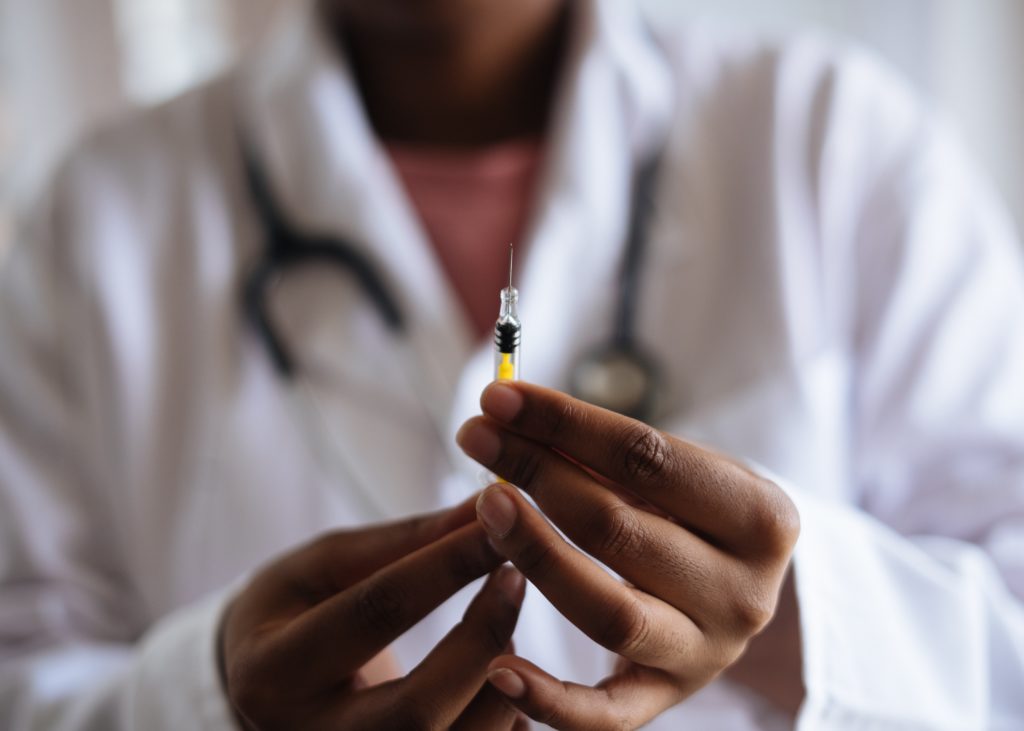Right now, all Vermonters who identify as Black, Indigenous, and People of Color (BIPOC) who are 16 or older, are eligible to register for vaccination, along with everyone living in their household. Anyone who falls into that category can register to receive the COVID-19 Vaccine here.
Prior to this stage, Vermont set up vaccination clinics for the members of households with eligible BIPOC in them, and later households with eligible individuals and BIPOC. These important initiatives were advocated for, organized, and run by some incredible advocates and organizers.
The Vermont Racial Justice Alliance played an enormous role in pushing for these clinics, disseminating information to BIPOC communities, and ensuring that the clinics ran smoothly. Organizations such as the Windham County NAACP and members and leaders of the Social Equity Caucus also played huge roles in getting these clinics set up. Individuals like the State’s director of racial equity Xusana Davis, VPIRG Votes endorsed Senator Kesha Ram, VTRJA director Mark Hughes and countless other community members and organizers made these clinics possible.
While vaccine eligibility should have been expanded to all BIPOC Vermonters earlier in order to ensure equitable vaccine distribution, the improved guidelines for BIPOC Vermonters and their households are a welcome change. And Governor Scott’s recent comments remind us that while he does not always use it, Scott plays an important role when it comes to the narrative around race in Vermont and in the nation. Scott’s comments emphasized the important distinction between Equality and Justice, the latter of which is not neutral to past and present systemic harms.
With BIPOC more likely to be exposed to the virus, more susceptible to harsher outcomes, and BIPOC vaccination levels still lagging 13.2% behind the levels of vaccination among white Vermonters, clearly we have not yet achieved justice. That is why we applaud the State’s decision to make all BIPOC Vermonters over 16 and members of their household eligible to register for the vaccine.
Despite this, the Governor has refused to follow the Vermont COVID-19 Vaccine Implementation Advisory Committee’s recommendations to open vaccinations to all incarcerated Vermonters. This Committee’s recommendation stems from the fact that that those housed in Vermont’s prisons are at extreme risk of contracting COVID and do not have access to the level of hygiene required to recover from the virus.
Black people make up only 1% of Vermont’s population but represent 10% of our prison population. Incarcerated individuals are no less worthy of life and denying them vaccination while putting them at risk is inhumane and disproportionately affects low income and BIPOC individuals. And while the BIPOC vaccination policy covers incarcerated Vermonters, others who do not meet the State’s age criteria nor identify as BIPOC remain ineligible for the vaccine — even though sharing a prison may be more close-quarters than sharing a household in some circumstances.
BIPOC are experiencing social and medical hardship at higher rates than white Vermonters, and yet, we are receiving vaccinations at a lower rate. It is clearer now than ever that we need justice not equality, and due to the work of lots of our incredible partners, we are on a path towards equity and justice.
Not only are BIPOC not vaccinated proportionally to our percentage of the population, we are also dying at much higher rates. This illuminates the differences between equality, equity, and justice.
Equality assumes that everyone starts with the same ability to access resources, information, and transportation, giving everyone the same theoretical ability to access things like vaccines. But we know that is not true. If everyone was eligible for the vaccine, those with the most access to transportation, money, time, and information, would get vaccinated first. These people would skew towards young, wealthy white folx, excluding the elderly, those who have English as a second language, those who work minimum wage jobs, BIPOC, those with pre-existing conditions, and many others. As we know, this is not the best way to save the most lives.
Equity on the other hand, understands that everyone is not equal not only in their access to vaccines but also in their risk of death if they contract COVID. An equitable system of distribution provides vaccines to those who need them most, first, which would be seen in the priority groups set up.
Justice is not only the recognition of inequality and inequity but the attempt to redress the past harms that create a system that is unequal. This is seen partially in the efforts by our partners and the administration in translation efforts, the creation of alternative methods of registration, unconventional information dissemination, and the shift toward community-focused and community-run vaccination information and clinics. We clearly have not achieved justice, in vaccination or in other operations, but the progress towards it seen in steps taken by our partners and the administration is a cause for hope and a call to action.

